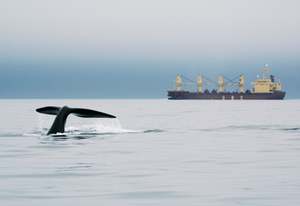Serendipitous study: whales relaxed in shipping lull after 9/11
Effects of Noise on Wildlife, Ocean, Shipping Add comments A fascinating new study provides the first direct evidence that shipping noise may increase stress levels in whales. During the days after the World Trade Center attacks, global shipping was halted; a team of researchers studying right whales in the Bay of Fundy decided to go ahead and continue collecting fecal samples, and were struck by how peaceful it was: Rosalind Rolland recalls that day and those following were like a primal ocean scene, “There was nobody out there except for us and the whales.”
A fascinating new study provides the first direct evidence that shipping noise may increase stress levels in whales. During the days after the World Trade Center attacks, global shipping was halted; a team of researchers studying right whales in the Bay of Fundy decided to go ahead and continue collecting fecal samples, and were struck by how peaceful it was: Rosalind Rolland recalls that day and those following were like a primal ocean scene, “There was nobody out there except for us and the whales.”
In 2009, Rolland realized that another researcher, Susan Parks, had recordings of noise levels for the days before and after 9/11, and so they joined forces to see whether the samples taken from whales on those days showed any changes in stress levels (fecal matter contains stress hormones that can be measured). As it turns out, the days after 9/11 mark the only time during Rolland’s five-year study that stress hormone levels were markedly lower than the overall average, and corresponded to a dramatic reduction in noise, especially low-frequency noise.
““This is what many of us had been looking for,” said Christopher Clark, director of the bioacoustics research program at the Cornell Lab of Ornithology, who was not a paper co-author. “Here is the first solid piece of evidence that says there’s a link between noise level and stress.” Clark noted stress has long been tied to longevity, reproduction, disease and other key health indicators in whales. Researchers have long speculated that noise could be a stressor for ocean creatures, but there is no practical way to test a correlation, since ocean noise is nearly omnipresent in most areas.
The fact that this is an opportunistic study does mean that it’s unlikely to be considered solid proof, or to influence ocean noise policy. As Dr. Rolland noted, “These are after all 50 tonne animals so they don’t make terribly easy things to study…Past studies have shown they alter their vocalisation pattern in a noisy environment just like we would in a cocktail party, but this is the first time the stress has been documented physiologically.”
Dr. Ian Boyd of the University of St. Andrews in Scotland, home to many top ocean noise researchers expressed uncertainty that such a short time period and small sample “shows what is claimed.” Boyd is one of a group of researchers advocating for a Quiet Ocean Experiment, in which large portions of ocean would be quieted for brief periods, allowing for more comprehensive studies of animal behavior and physiology before, during, and after the experimental periods. To implement this idea, global shipping routes would need to be shifted for the duration of the experiment.
